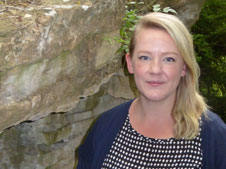 Friday 2 June 2017 4:48pm
Friday 2 June 2017 4:48pm
Dr Lindsay Robertson
Dramatically changing the way tobacco is sold will be a crucial step in achieving the Government's 2025 smokefree goal, according to new University of Otago research that examined the views of smokefree experts throughout New Zealand.
The study, which involved in-depth interviews with 25 experts working in academia, public health, Māori and Pacific health and smoking cessation, found they viewed a large reduction in the number of places selling tobacco as critical to achieving the 2025 goal. It appears in today's edition of the New Zealand Medical Journal.
“Most experts had worked in the smokefree area for a long time and provided first-hand insights into the problems caused by tobacco being sold so widely,” says Dr Lindsay Robertson, the lead researcher.
Those problems included more sales to minors and a greater risk of children using tobacco, and undermining smokers' attempts to quit.
Participants held very consistent views on where tobacco should and should not be sold in the long-term. “Our participants believed that allowing tobacco sales only from a very small number of places – whether an R18 tobacco-only store, or a pharmacist – in each district, and ensuring these outlets were located away from schools, was an important strategy for realising the 2025 goal,” Dr Robertson says.
The experts interviewed for the study considered licensing of tobacco retailers one way in which changes to tobacco retailing could be introduced.
The researchers say their earlier research with retailers found they wanted a level playing field that did not disadvantage them relative to other retailers.
“Our new study is timely, given recent reports of tobacco-related crime. We believe the Government needs urgently to consider solutions that will both help achieve the 2025 smokefree goal, and keep retailers safe,” says Dr Robertson.
“Removing tobacco from all current outlets, and allowing it to be sold only from a small number of specialised outlets with appropriate security would create the level playing field retailers seek and would not disadvantage one type of shop over another.”
The study, titled “NZ tobacco control experts' views towards policies to reduce tobacco availability” was authored by Dr Lindsay Robertson, Dr Louise Marsh and Professor Rob McGee from the Cancer Society Social and Behavioural Research Unit, and Professor Janet Hoek from the Department of Marketing, all from the University of Otago. All researchers belong to the ASPIRE2025 research collaboration.
This research was supported by Lottery Health Research New Zealand, the Asthma and Respiratory Foundation of New Zealand and the Cancer Society of New Zealand.
For more information, contact:
Dr Lindsay Robertson
Cancer Society Social and Behavioural Research Unit
Department of Preventive and Social Medicine
University of Otago
Tel 64 3 479 7177
Email l.robertson@otago.ac.nz
A list of Otago experts available for media comment is available elsewhere on this website.
Electronic addresses (including email accounts, instant messaging services, or telephone accounts) published on this page are for the sole purpose of contact with the individuals concerned, in their capacity as officers, employees or students of the University of Otago, or their respective organisation. Publication of any such electronic address is not to be taken as consent to receive unsolicited commercial electronic messages by the address holder.
